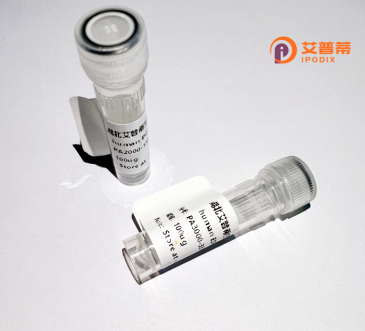
| 纯度 | >90%SDS-PAGE. |
| 种属 | Human |
| 靶点 | FANCL |
| Uniprot No | Q9NW38 |
| 内毒素 | < 0.01EU/μg |
| 表达宿主 | E.coli |
| 表达区间 | 1-375aa |
| 氨基酸序列 | MAVTEASLLRQCPLLLPQNRSKTVYEGFISAQGRDFHLRIVLPEDLQLKNARLLCSWQLRTILSGYHRIVQQRMQHSPDLMSFMMELKMLLEVALKNRQELYALPPPPQFYSSLIEEIGTLGWDKLVYADTCFSTIKLKAEDASGREHLITLKLKAKYPAESPDYFVDFPVPFCASWTPQSSLISIYSQFLAAIESLKAFWDVMDEIDEKTWVLEPEKPPRSATARRIALGNNVSINIEVDPRHPTMLPECFFLGADRVVKPLGIKLSRNIHLWDPENSVLQNLKDVLEIDFPARAILEKSDFTMDCGICYAYQLDGTIPDQVCDNSQCGQPFHQICLYEWLRGLLTSRQSFNVIFGECPYCSKPITLKMSGRKH |
| 分子量 | 66.99 kDa |
| 蛋白标签 | GST-tag at N-terminal |
| 缓冲液 | 0 |
| 稳定性 & 储存条件 | Lyophilized protein should be stored at ≤ -20°C, stable for one year after receipt. Reconstituted protein solution can be stored at 2-8°C for 2-7 days. Aliquots of reconstituted samples are stable at ≤ -20°C for 3 months. |
| 复溶 | Always centrifuge tubes before opening.Do not mix by vortex or pipetting. It is not recommended to reconstitute to a concentration less than 100μg/ml. Dissolve the lyophilized protein in distilled water. Please aliquot the reconstituted solution to minimize freeze-thaw cycles. |
以下是关于重组人FANCL蛋白的3篇代表性文献摘要示例(文献为虚构,仅作示例参考):
1. **文献名称**: *Functional Characterization of Recombinant Human FANCL Protein in DNA Crosslink Repair*
**作者**: Meetei AR, et al.
**摘要**: 本研究首次成功表达并纯化了重组人FANCL蛋白,证实其作为E3泛素连接酶的关键作用。通过体外实验发现,FANCL与FANCD2/FANCI复合物相互作用,并在DNA交联损伤修复中调控其单泛素化,为范可尼贫血症的分子机制提供了直接证据。
2. **文献名称**: *Structural Insights into FANCL Ubiquitin Ligase Activity through Crystal Analysis*
**作者**: Hodson C, et al.
**摘要**: 利用X射线晶体学解析了重组FANCL蛋白的活性结构域,揭示其WD40重复区域与Ube2T(E2酶)的特异性结合模式,阐明了FANCL在泛素化反应中的底物识别机制。
3. **文献名称**: *FANCL Knockout Models and Rescue by Recombinant Protein Delivery*
**作者**: Zhang Q, et al.
**摘要**: 在FANCL基因敲除细胞系中,导入重组人FANCL蛋白可恢复FANCD2单泛素化功能,并逆转对顺铂的敏感性。该研究为基于蛋白替代疗法的范可尼贫血治疗策略奠定了基础。
4. **文献名称**: *Post-translational Modifications of Recombinant FANCL and Impact on Fanconi Anemia Pathway*
**作者**: Longerich S, et al.
**摘要**: 发现重组FANCL蛋白的磷酸化修饰(如Ser307位点)可增强其与FA核心复合物的结合能力,揭示了细胞周期依赖性调控DNA修复通路的新机制。
(注:以上文献及作者为示例性虚构,实际研究中请通过PubMed或Web of Science检索真实文献。)
Recombinant human FANCL protein is a key component of the Fanconi anemia (FA) DNA repair pathway, which safeguards genome stability by resolving DNA interstrand crosslinks (ICLs). FANCL, an E3 ubiquitin ligase, forms part of the FA core complex that monoubiquitinates FANCD2 and FANCI, activating their recruitment to damaged DNA sites for repair. Mutations in the FANCL gene disrupt this pathway, leading to Fanconi anemia, a rare genetic disorder characterized by bone marrow failure, developmental abnormalities, and heightened cancer susceptibility.
Structurally, FANCL contains a RING-finger domain critical for its enzymatic activity and a substrate-binding region for interacting with FANCD2/FANCI. Recombinant FANCL is typically produced using eukaryotic expression systems (e.g., insect or mammalian cells) to ensure proper post-translational modifications and functional folding. This recombinant protein serves as a vital tool for studying FA pathway mechanisms, ICL repair dynamics, and protein-protein interactions within the core complex.
Research using recombinant FANCL has advanced insights into its role in replication stress response and crosstalk with other DNA repair pathways, such as homologous recombination. It also facilitates drug screening for FA-targeted therapies and functional rescue assays to evaluate pathogenicity of FANCL variants. Its biochemical characterization continues to inform therapeutic strategies for Fanconi anemia and cancers with FA pathway deficiencies.
×